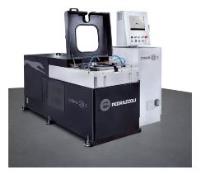 Add My Company
Add My Company
Sign In

THE MOST COMMON TYPES OF TUBE END FORMING MACHINES
Are you looking for tube end forming machine manufacturers? Here at Workshop Press, we supply a wide range of metal working machinery, tube end forming machines being one of them. Tube End Forming Machines do precisely as their name suggests. They form or shape the end of tubes or pipes to accommodate the customer’s specific application. The forming process can include expanding, reducing, crimping, crowing, swaging, slotting, beading, flaring, star-forming, and thickening of the tube end.
TUBE END FORMING MACHINES
Tube End Formers and Pipe End Formers manipulate the end of the tube or pipe facilitating a clean and integral connection between two pipes. The forming of the tube can be carried out in a variety of shapes and geometries. The type of end form used depends on the intended use of the tube junction or pipe junction. In addition, forming the end of tubes or pipes can also be used to create connections between other different types. For instance, connecting it to a pliable hose or an assembly divider block.
Before or after the tube end is formed, seals, rings, fittings, collar nuts, swage collars and other components can be implemented. Therefore, facilitating an excellent connection between tube and pipe sections. There are many applications where people use tube end forming. This includes, automotive exhausts, furniture, air conditioning, refrigeration, hydraulics, tent poles, water transmission lines, gas transmission lines, braking systems.
Furthermore, the two most common types of Tube End Forming are Expanding and Reducing.
EXPANDING
Expanding the tube end is carried out by placing the tube or pipe into a hydraulic clamp and then forcing a mandrel into the end of the profile. The extent the tube or pipe can expand is contingent on a variety of factors. Such as, the type of material, the outside diameter of the tube and the wall thickness of the tube. As well as, the ratio the outside diameter to wall thickness of the tube (this ratio is called the Wall Factor). A typical application for expanding a tube is to expand it far enough so that it slips over a tube of its original outside diameter. Consequently, creating a sound tube junction which can be brazed or welded.
REDUCING
Reducing a tube or pipe is the direct opposite process as expanding. The tube end is reduced so that tube snugly slips into the inside of the tube’s own internal diameter. This junction then is usually completed with a brazing or a welding process. The tube end forming machine carries out this the reducing process by hydraulically sliding a reducing collar over the end of the tube.
The most popular processes are typically carried out by hydraulic ram forming. This is because this ram forming process is quick to set up and simple to carry out. End forming machines can also be configured and set up to use segmented fingers for expanding or segmented jaws for reducing. In addition, they come in single-head or double-headed machines which can carry out two processes with one setup.
GET IN TOUCH TODAY
If you enjoyed reading this blog, why not take a look at: Horizontal Press Brakes | The Basics & Benefits. Alternatively if you are looking for tube end forming machine manufacturers and need some purchasing assistance, get in touch today. Our friendly team will be happy to answer and questions you may have.
For more information on THE MOST COMMON TYPES OF TUBE END FORMING MACHINES talk to WorkshopPress.co.uk
Enquire Now
List your company on FindTheNeedle.
